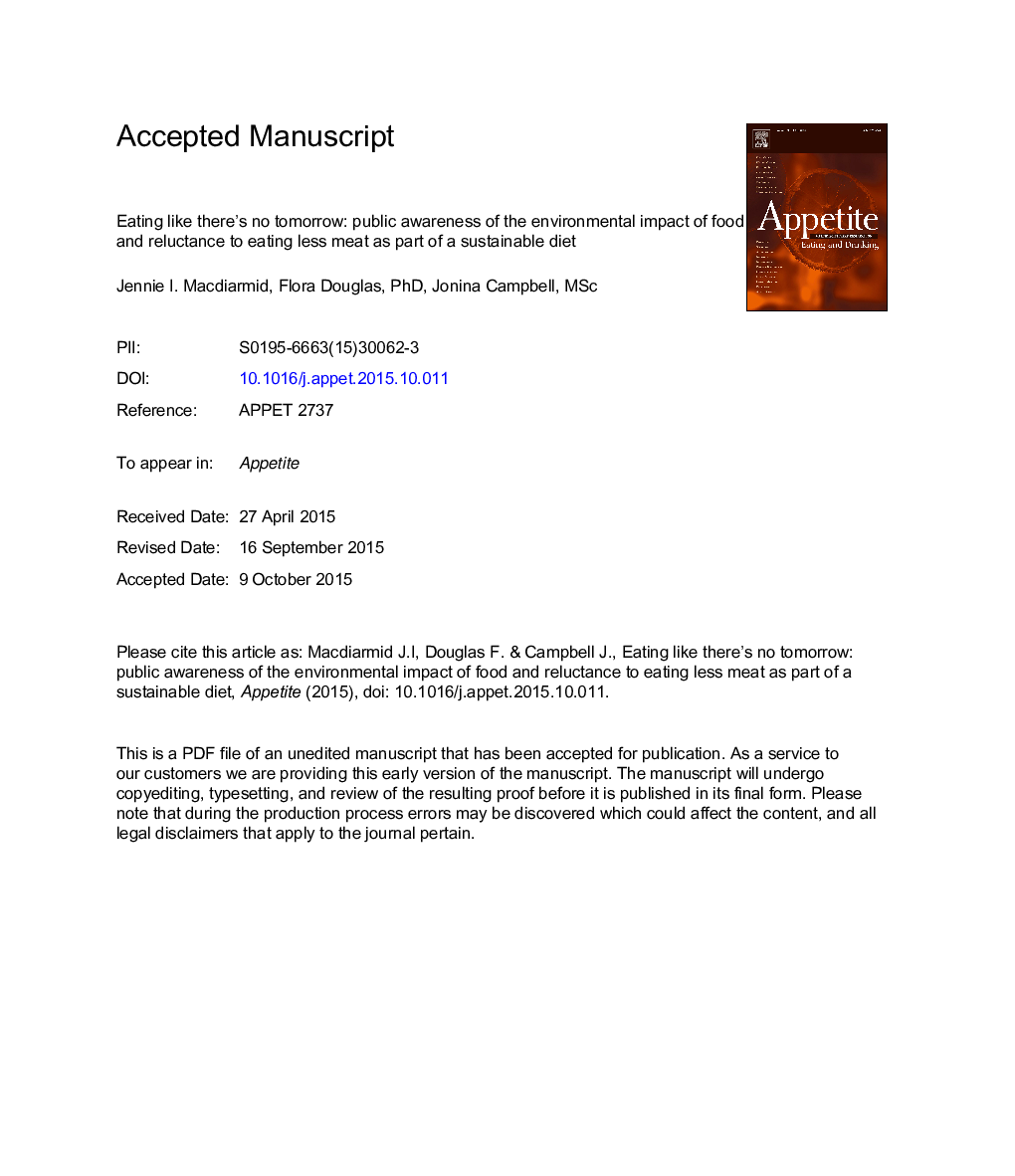| کد مقاله | کد نشریه | سال انتشار | مقاله انگلیسی | نسخه تمام متن |
|---|---|---|---|---|
| 7308404 | 1475384 | 2016 | 31 صفحه PDF | دانلود رایگان |
عنوان انگلیسی مقاله ISI
Eating like there's no tomorrow: Public awareness of the environmental impact of food and reluctance to eat less meat as part of a sustainable diet
ترجمه فارسی عنوان
خوردن مانند فردا وجود ندارد: آگاهی عمومی از اثرات زیست محیطی مواد غذایی و عدم تمایل به خوردن گوشت کمتری بخشی از یک رژیم پایدار
دانلود مقاله + سفارش ترجمه
دانلود مقاله ISI انگلیسی
رایگان برای ایرانیان
کلمات کلیدی
رژیم های پایدار، گوشت نگرش های، فرهنگ، تغییر آب و هوا، گروه های تمرکز
ترجمه چکیده
کاهش مصرف گوشت در بسیاری از بحث های علمی در مورد رژیم های سالم و پایدار به علت تاثیرات زیست محیطی تولید گوشت، متمرکز است. از دست دادن این بحث ها، دیدگاه های عمومی در مورد خوردن گوشت کمتر و توجه به ارزش های فرهنگی و اجتماعی مربوط به گوشت است. هدف از این مطالعه بررسی آگاهی عمومی از تاثیرات زیست محیطی مواد غذایی و تمایل آنها برای کاهش مصرف گوشت است. دوازده گروه تمرکز و چهار مصاحبه فردی با بزرگسالان از طیف وسیعی از گروه های اجتماعی و اقتصادی زندگی می کردند که در مناطق روستایی و شهری در اسکاتلند زندگی می کردند. درک عمومی از ارتباط بین غذا، محیط زیست و تغییرات آب و هوایی بررسی شد، با توجه به گوشت و نگرش نسبت به کاهش مصرف گوشت. داده ها به صورت تئوری و رونویسی شدند. سه موضوع غالب به وجود آمد: فقدان آگاهی از ارتباط بین مصرف گوشت و تغییرات آب و هوایی، ادراکات مصرف گوشت شخصی، نقش حداقل در زمینه جهانی تغییرات آب و هوایی، و مقاومت در برابر ایده کاهش مصرف گوشت شخصی. افراد با خوردن گوشت با لذت و ارزش های اجتماعی، شخصی و فرهنگی در اطراف گوشت غذا را توصیف می کنند. بعضی از مردم احساس کردند که نیازی به خوردن گوشت کمتری ندارند، زیرا قبلا مصرف خود را کاهش داده یا فقط مقادیر کمتری مصرف کرده اند. شواهد علمی که گوشت و تغییرات آب و هوایی را در بر می گیرد، پیچیدگی مشترک است. تغییر رفتارهای غیر غذایی در مقایسه با تغییرات اقلیمی قابل قبول تر و اولویت بیشتری است. این مطالعه نشان می دهد نقش گوشت در رژیم غذایی برای بسیاری از مردم بیش از نیازهای غذایی است. اگر عادات سالم و رژیم غذایی پایدار به دست می آید، ارزش های فرهنگی، اجتماعی و شخصی در اطراف خوردن گوشت باید در توسعه توصیه های تغذیه ای آینده باشد.
موضوعات مرتبط
علوم زیستی و بیوفناوری
علوم کشاورزی و بیولوژیک
دانش تغذیه
چکیده انگلیسی
Reducing meat consumption is central to many of the scientific debates on healthy, sustainable diets because of the high environmental impact of meat production. Missing from these debates are the public perspectives about eating less meat and consideration of cultural and social values associated with meat. The aim of this study was to explore public awareness of the environmental impact of food and their willingness to reduce meat consumption. Twelve focus groups and four individual interviews were conducted with adults from a range of socio-economic groups living in both rural and urban settings in Scotland. Public understanding of the link between food, environment and climate change was explored, with a focus on meat and attitudes towards reducing meat consumption. Data were transcribed and analysed thematically. Three dominant themes emerged: a lack of awareness of the association between meat consumption and climate change, perceptions of personal meat consumption playing a minimal role in the global context of climate change, and resistance to the idea of reducing personal meat consumption. People associated eating meat with pleasure, and described social, personal and cultural values around eating meat. Some people felt they did not need to eat less meat because they had already reduced their consumption or that they only ate small quantities. Scepticism of scientific evidence linking meat and climate change was common. Changing non-food related behaviours was viewed as more acceptable and a greater priority for climate change mitigation. The study highlights the role meat plays in the diet for many people, beyond nutritional needs. If healthy, sustainable dietary habits are to be achieved, cultural, social and personal values around eating meat must be integrated into the development of future dietary recommendations.
ناشر
Database: Elsevier - ScienceDirect (ساینس دایرکت)
Journal: Appetite - Volume 96, 1 January 2016, Pages 487-493
Journal: Appetite - Volume 96, 1 January 2016, Pages 487-493
نویسندگان
Jennie I. Macdiarmid, Flora Douglas, Jonina Campbell,
